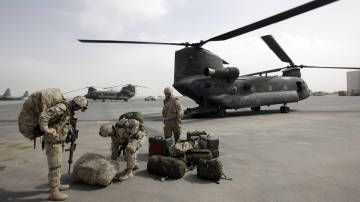STORY about Peace/WarSports posted on March 1, 2010 by acrosby
A Canadian Snapshot of the War in Afghanistan: Military Offensive Trumps Olympic Truce
2010 Olympic Truce Called Despite Major Offensive in Marjah, Afghanistan
Also posted by acrosby:
Also in Sports:
Just over 30 years ago, the Soviet Union launched a military offensive into Afghanistan, prompting Canada to join the United States and dozens of other countries to boycott the 1980 Summer Olympics in Moscow.
In an ironic twist of events, Canada is currently hosting the 2010 Olympics while being an integral part of the NATO occupation force in Afghanistan. Compounding this, ignoring calls for the observation of the Olympic truce, Canada participated in the largest military offensive since the beginning of the war as the international spotlight shifted from central Asia to the Olympic opening ceremonies.
Days before the opening ceremonies in Vancouver, UN Secretary General Ban Ki-moon called for the world to respect the Olympic truce and urged countries at war to cease hostilities. Regarding the Olympics he spoke of a “terrible paradox” in which “we rightly honour the outstanding achievements of the human body and the positive social values of competitive sport, including team spirit and fairness. Yet all too often, through the carnage of war, we do terrible damage to that same human body, and to our shared values.”
The notion of the Olympic Truce dates back to 776 BCE in Greece. According to the Perseus Project at Tufts University, “(d)uring the truce, wars were suspended, armies were prohibited from entering Elis or threatening the Games, and legal disputes and the carrying out of death penalties were forbidden.” The Olympic truce was respected for twelve centuries.
With the Games being reintroduced in Athens in 1896, the violent century that followed overshadowed any notions of peace that once accompanied the Olympic Games. However, the truce has been invoked more recently throughout the 1990s and the current decade, with the United Nations General Assembly adopting numerous resolutions supporting the idea of peace surrounding the Olympic Truce.
The Vancouver Organizing Committee (VANOC) had posted on its website that,
“(d)uring the Truce period, the athletes, artists and their families, as well as ordinary pilgrims, could travel in total safety to participate in or attend the Olympic Games and return afterwards to their respective countries. Taking into account the global political reality in which sport and the Olympic Games exist, the International Olympic Committee (IOC) decided to revive the ancient concept of the Olympic Truce with the view to protecting, as far as possible, the interests of the athletes and sport in general, and to contribute to searching for peaceful and diplomatic solutions to the conflicts around the world."
What VANOC had failed to include was the notion of the suspension of war, limiting its definition of the truce to include mobility into and out of the Vancouver area. Furthermore, the Vancouver Integrated Security Unit failed to live up to the notion of unrestricted mobility by limiting access to certain foreign journalists into the country.
The UN Secretary General’s call for the Olympic Truce to bring “hope of at least a temporary respite from violence and armed conflict,” was lost as NATO forces launched a major offensive in Afghanistan.
Operation Moshtarak has involved the mobilization of 15,000 NATO and Afghan National Army (ANA) troops to the city of Marjah, a Taliban stronghold described as a “festering sore” in central Helmand province. The mission is described as the largest air operation of the war and the Canadian Forces have played a pivotal role in transporting NATO troops into the battle using three large Chinook helicopters to ferry soldiers while four Griffon helicopters provided support; a few dozen Canadian soldiers remain on the ground around the city. Casualties were expected to be high and civilian casualties described by NATO commanders as “inevitable”.
By February 25th, the Afghan Human Rights Commission reported 28 civilians killed, including 13 children, with 70 wounded in Marjah. These numbers are compounded by the NATO air strike on February 21st in central Uruzgan province which killed at least 21 civilians. This horrific incident resulted in NATO Commander General Stanley McChrystal issuing a public apology while Afghan senators demanded the execution of foreign troops for killing innocent civilians. NATO losses in Marjah are reported to be 13 NATO and 2 ANA killed, with 80 NATO and 8 ANA wounded. Although the Afghan flag has been raised in the city to symbolize government control, the fighting does not appear to be over.
While Canada has played a minimal role in the recent assault, Canadian Brigadier-General Craig King, NATO’s director of future plans in southern Afghanistan, says that Marjah is being used as preparation for a larger series of assaults in and around Kandahar in the coming months. “The Canadians are going to be very actively engaged in that, just as the marines and the British are right now in central Helmand, General King told the Globe and Mail. “We are going to be, come the summer, the tip of the spear for Afghanistan here. [Fighting] is going to shift to Kandahar, and the Canadians are going to be, along with our American allies, right at the forefront of that spear.”
The generals have hinted that the coming military operations in Kandahar will be quantitatively comparable to what is happening in Marjah now, aiming to “break the back” of the Taliban. All of this in the months leading to 2011, the year that Canada’s military mission will end in Afghanistan. In the Fall of 2009, numerous statements were made by Canadian officials signalling that Canadian troops would remain in Kandahar past 2011, but not engaged in a military role.
The site for the Vancouver local of The Media Co-op has been archived and will no longer be updated. Please visit the main Media Co-op website to learn more about the organization.
